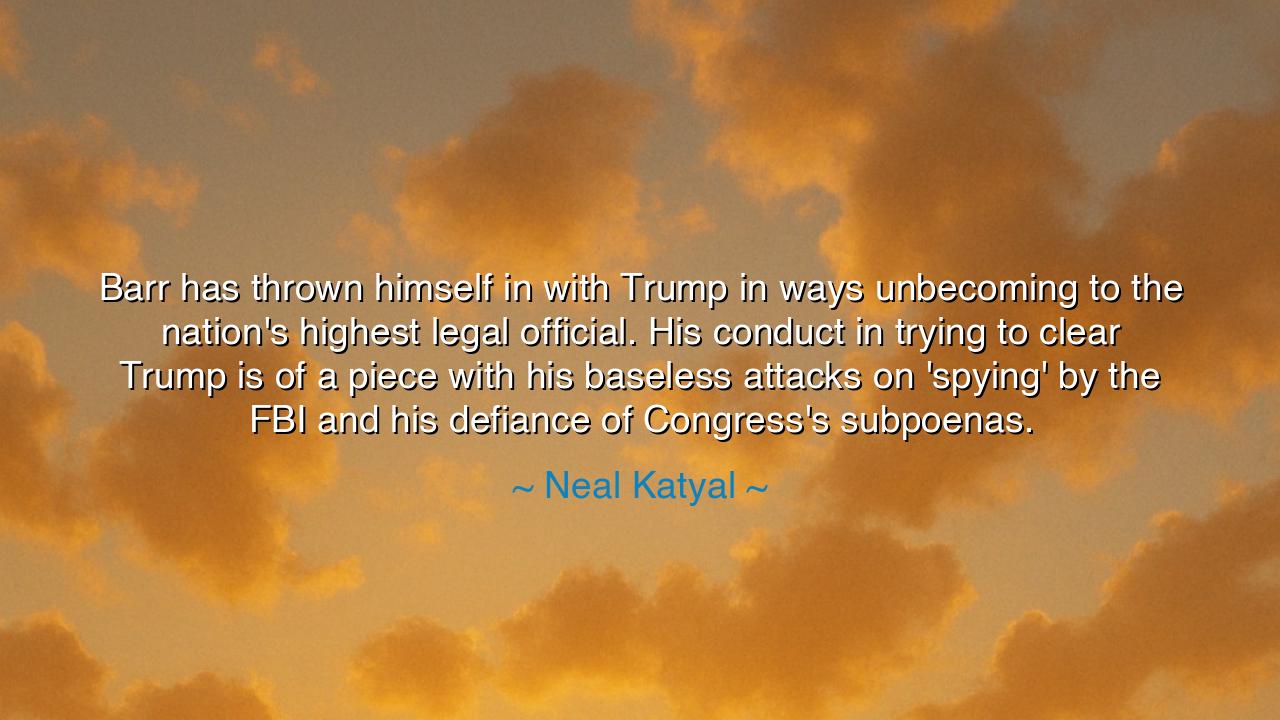
Barr has thrown himself in with Trump in ways unbecoming to the
Barr has thrown himself in with Trump in ways unbecoming to the nation's highest legal official. His conduct in trying to clear Trump is of a piece with his baseless attacks on 'spying' by the FBI and his defiance of Congress's subpoenas.






Hear the words of Neal Katyal, a guardian of the Constitution, who spoke with fire and sorrow: “Barr has thrown himself in with Trump in ways unbecoming to the nation’s highest legal official. His conduct in trying to clear Trump is of a piece with his baseless attacks on ‘spying’ by the FBI and his defiance of Congress’s subpoenas.” These words do not merely condemn a man, but warn a people of the fragility of their institutions when the keepers of law forsake their duty to serve truth and bend instead toward power.
When Katyal speaks of “the nation’s highest legal official,” he invokes the solemn title of the Attorney General, not as a mere post in government, but as the embodiment of the law’s impartiality. The Attorney General’s charge is to serve justice, not kings, not parties, not personal ambition. To act “unbecoming” of this role is to betray the sacred trust placed by the people in the law itself. Thus, Katyal’s rebuke is not simply political—it is moral, a cry that the law must never be used as a shield for one man’s power.
The phrase “trying to clear Trump” points to a dangerous alignment, where the law becomes not a scale of justice but a weapon of defense for the mighty. To “clear” rather than to investigate, to shield rather than to reveal—this is to twist the law’s purpose, to make it a servant of politics rather than truth. Katyal warns that when this happens, the people lose faith not only in one man, but in the very system designed to hold power accountable.
And when he speaks of “baseless attacks on spying by the FBI” and “defiance of Congress’s subpoenas,” he reveals the larger pattern of defiance against the pillars of accountability. The FBI, the Congress—these are institutions meant to check the excesses of power, to ensure that no leader stands above the law. To attack them without cause, to defy their lawful demands, is to chip away at the very architecture of democracy. Katyal’s words echo an ancient truth: when the guardians of the law side with rulers against institutions, tyranny is not far behind.
History offers us a mirror in the story of Richard Nixon and the Watergate scandal. When Nixon sought to hide the truth, it was not his enemies but his own Attorney General, Elliot Richardson, who stood firm. Richardson refused to obey Nixon’s order to fire the special prosecutor investigating him, and in what became known as the “Saturday Night Massacre,” he resigned rather than betray his oath. That act of courage preserved the dignity of the office and reminded the nation that no man, not even the president, was above the law. Katyal’s lament over Barr points to the absence of such courage in his time.
The deeper meaning of this rebuke is that the law itself depends upon the character of those who uphold it. Statutes may be written, institutions may be built, but if those entrusted with power bend the law to protect rulers instead of people, justice becomes a hollow shell. It is not enough to have laws on paper; one must also have leaders of integrity, who remember that their highest allegiance is not to man, but to the Constitution and to truth.
Children of tomorrow, take this wisdom to heart: beware of those who would twist the law to serve power. Demand integrity from your leaders, and honor those who place duty above loyalty to any single person. In your own lives, let truth be your guide, even when it costs you, even when it isolates you. For the strength of a republic lies not in its wealth or armies, but in its fidelity to justice, and in the courage of its people to demand that fidelity.
Thus, the wisdom of Katyal’s words endures: that the Attorney General, as the highest legal official, must never be a shield for rulers but a servant of the law. To betray that role is to endanger democracy itself. Let this teaching be remembered, so that you may guard against corruption, hold power to account, and ensure that justice remains the inheritance of all, not the possession of the few.






AAdministratorAdministrator
Welcome, honored guests. Please leave a comment, we will respond soon